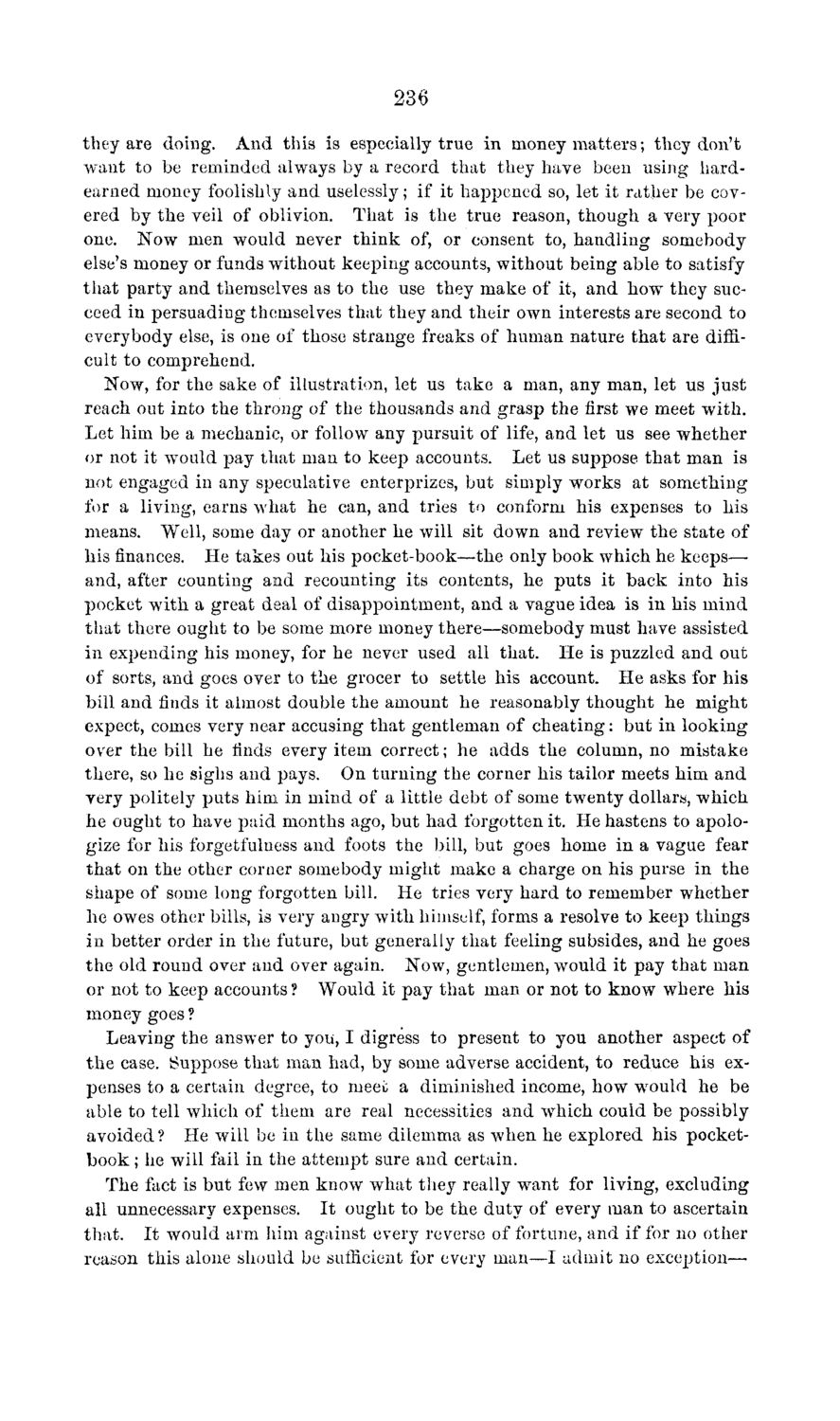| |
| |
Caption: Board of Trustees Minutes - 1869
This is a reduced-resolution page image for fast online browsing.

EXTRACTED TEXT FROM PAGE:
236 they are doing. And this is especially true in money matters; they don't want to be reminded always by a record that they have been using hardearned money foolishly and uselessly; if it happened so, let it rather be covered by the veil of oblivion. That is the true reason, though a very poor one. Now men would never think of, or consent to, handling somebody else's money or funds without keeping accounts, without being able to satisfy t h a t party and themselves as to the use they make of it, and how they succeed in persuading themselves that they and their own interests are second to everybody else, is one of those strange freaks of human nature that are difficult to comprehend. Now, for the sake of illustration, let us take a man, any man, let us just reach out into the throng of the thousands and grasp the first we meet with. Let him be a mechanic, or follow any pursuit of life, and let us see whether or not it wrould pay that man to keep accounts. Let us suppose that man is not engaged in any speculative enterprizes, but simply works at something for a living, earns what he can, and tries to conform his expenses to his means. Well, some day or another he will sit down and review the state of his finances. He takes out his pocket-book—the only book which he keeps—• and, after counting and recounting its contents, he puts it back into his pocket w i t h a great deal of disappointment, and a vague idea is in his mind t h a t there ought to be some more money there—somebody must have assisted in expending his money, for he never used all that. He is puzzled and out of sorts, and goes over to the grocer to settle his account. H e asks for his bill and finds it almost double the amount he reasonably thought he might exjDect, comes very near accusing that gentleman of cheating: but in looking over the bill he finds every item correct; he adds the column, no mistake there, so he sighs and pays. On turning the corner his tailor meets him and very politely puts him in mind of a little debt of some twenty dollars, which he ought to have paid months ago, but had forgotten it. He hastens to apologize for his forgetfulness and foots the bill, but goes home in a vague fear that on the other corner somebody might make a charge on his purse in t h e shape of some long forgotten bill. He tries very hard to remember whether he owes other bills, is very angry with himself, forms a resolve to keep things in better order in the future, but generally that feeling subsides, and he goes the old round over and over again. Now, gentlemen, would it pay that man or not to keep accounts? Would it pay that man or not to know where his money goes ? Leaving the answer to you, I digress to present to you another aspect of t h e case. Suppose that man had, by some adverse accident, to reduce his expenses to a certain degree, to meei: a diminished income, how would he be able to tell which of them are real necessities and which could be possibly avoided ? He will be in the same dilemma as when he explored his pocketbook ; he will fail in the attempt sure and certain. The fact is but few men know what they really want for living, excluding all unnecessary expenses. It ought to be the duty of every man to ascertain that. I t would arm him against every reverse of fortune, and if for no other reason this alone should be sufficient for every man—I admit no exception—
| |